#lady macbeth of mtsensk district
Explore tagged Tumblr posts
Text
i had some pretty incoherent thoughts earlier about katya and sergey but it resulted in me reinforcing the fact that SERGEY DOESN'T LOVE HER!!!! i hate him so muuuch but it's quite funny (stupid) how as soon as katya fell in love with (became obsessed with) him, he's all like... "aww gee 😕😬 sorryyy.. you're like taking a position above me.... 😕😕 haha this is awkwarddd 😅 this wasn't meant to happen i'm not happy anymore soz..." like Dude... coward
#anyway i could do better#sergey could NEVER match her freak soz. he doesn't deserve to.#like katyasergey forever but just the katya bit#operaposting#lady macbeth of mtsensk district#lady macbeth
4 notes
·
View notes
Text

youtube
7 notes
·
View notes
Text
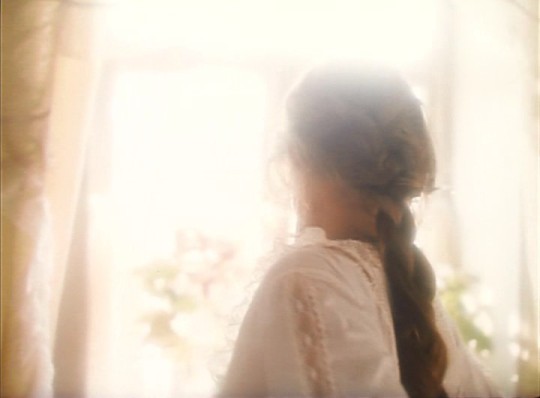

Lady Macbeth of the Mtsensk District, 1989
434 notes
·
View notes
Text
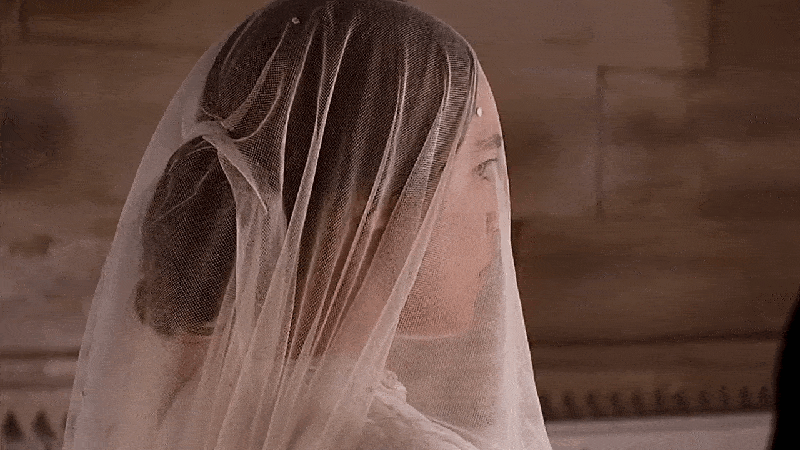
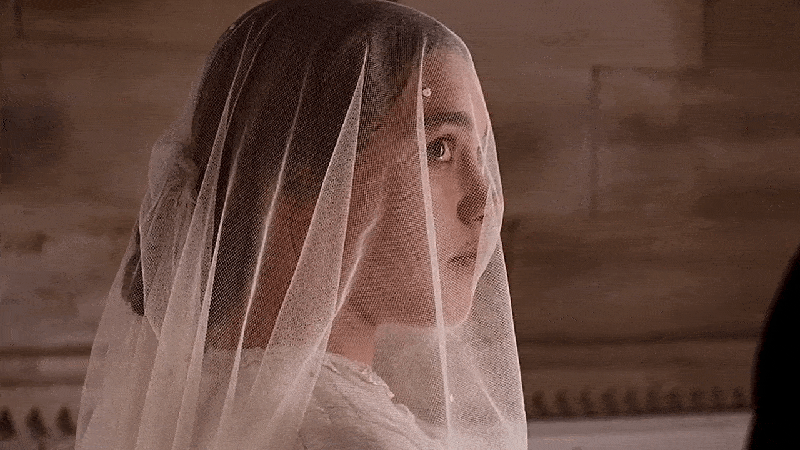
FLORENCE PUGH as KATHERINE LESTER
Lady Macbeth (2016), Dir. William Oldroyd
#lady macbeth#lady macbeth film#lady macbeth 2016#lady macbeth of the mtsensk district#florence pugh#florence pugh edit#fpughedit#perioddrama#period drama costumes#period drama#perioddramagif#perioddramaedit#filmedit#historical drama#period drama edit#perioddramacentral#perioddramasource#william oldroyd#cosmo jarvis
198 notes
·
View notes
Text
man can we talk about how much of an icon shostakovich was writing "lady macbeth of the mtsensk district" okay so for some context, the opera was written in 1932 and is based on the nikolai leskov novel of the same name. in the late 20s/early 30s soviet union, feminist ideology was the focus of a lot of cultural discussions, and this is very much reflected in "lady macbeth," a story originally about a femme fatale whom shostakovich largely humanizes and portrays as a victim of circumstance. (he was also planning on writing a cycle of operas centering around female protagonists, but after the 1936 denunciation, this obviously never happened.) so I want to highlight two interesting sources when it comes to feminism and "lady macbeth"- so this first bit comes from an interview with nadezhda welter in elizabeth wilson's bio, who premiered the role of sonyetka. in many productions of the opera, sonyetka is portrayed as a selfish "whore" to katerina's quasi-"madonna," using her sexuality to seduce katerina's (god-awful) lover and drive her to her demise. however, according to welter, shostakovich had a far more nuanced vision for this character, seeing her as a young and immature victim of systemic class and gender discrimination -

and then there's how shostakovich characterizes katerina herself. this is from a letter to his friend isaak glikman in 1962. after stalin's death, shostakovich wanted to get his opera restaged after it had been censored for years. however, it's interesting to me how he reacts with disgust to a theatre producer’s proposition that the character of katerina should be pregnant in a revival of the opera, in order to make her more sympathetic to audiences.

for context on the opera, katerina is a highly complex character. she's desperate for a way out of her social situation and her life with an abusive husband and father-in-law. she's later sexually assaulted by this guy named sergei, but she ends up entering a relationship with him, possibly because between sergei and her husband, she views him as the lesser of two evils. throughout the opera, we see sergei's repulsive views on women, and katerina seems more than anything like she's trying to convince herself she made the right decision, that as horrific as sergei is, she's better off with him than her husband. she and sergei murder her husband and father-in-law, but at the wedding, a drunk peasant discovers the bodies in a cellar. they are arrested and sent to a prison camp, and katerina remains devoted to sergei- if only because he's all she has left. meanwhile, sergei cheats on her with sonyetka, a young prostitute also in the prison camp.
in other words, katerina has been through absolute hell, and yet this producer suggests she's somehow not sympathetic enough, and that on top of all that, she has to be pregnant to evoke sympathy from the audience. thankfully, shostakovich did not go through with that suggestion, recognizing how unnecessary it was.
#classical music#music#opera#music history#lady macbeth of the mtsensk district#shostakovich#dmitri shostakovich#classical music history#composer#btw the vienna state opera is streaming lady macbeth tomorrow lol#so now I'm thinking about it a lot
36 notes
·
View notes
Text
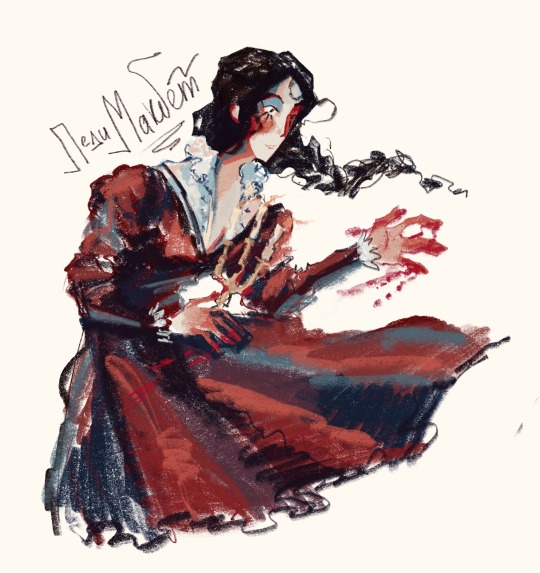
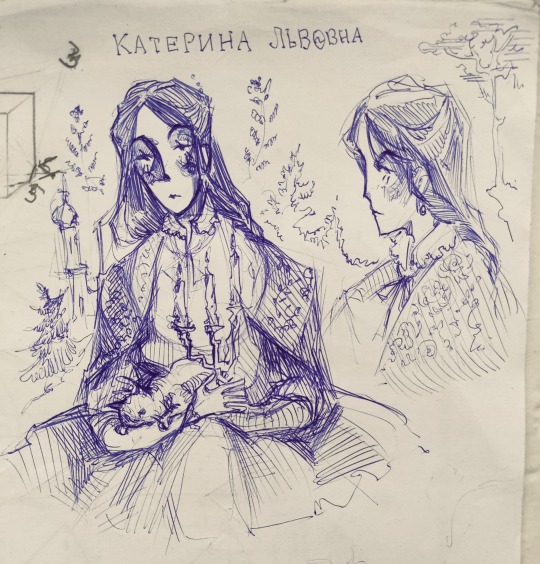

*wannabe lady macbeth but fails miserably*
#lady macbeth of the mtsensk district#katerina lvovna izmailova#katerina izmailova#nikolai leskov#ruslit#russian literature#katerina kabanova#lady macbeth#rknchan art
34 notes
·
View notes
Text

…it’s only 15 chapters long
1 note
·
View note
Text
Aziraphale & Shostakovich
The moment in the record shop when Aziraphale said he was picking up a Shostakovich record I had So Many Thoughts.
The symphony he's listening to is Symphony No.5 in D Minor, Op. 47, composed in 1937 and premiered in Leningrad to a thirty+ minute long standing ovation. Prior to this piece, Dimitri S. spent many nights sleeping in the hallway outside of his apartment so that his family wouldn't see if the government police in charge of enforcing Stalin's brutal rule came for him in the middle of the night. His last pieces had been received harshly by critics and called unpatriotic, which was just about the worst thing a composer living during The Great Terror (1936-1938) could do. Those who were not loyal to the regime and explicitly portrayed it in their art were branded as traitors and sent to gulags or were straight up executed.
The San Francisco Symphony describes the 5th symphony as "the story of a fall from grace and redemption.". Shostakovitch has gone from being a golden example to being eyed as a traitor almost overnight, the 5th Symphony becoming his redemption back into good graces.
So basically Dimitri S. was a man with contrasting ideologies to the powers that be, so to say, who was living under the threat of death, torture, or excommunication from his homeland. Haha, so weird that Aziraphale would want to listen to his music specifically.
(If you've never listened to Symphony No. 5, I highly encourage you to go listen!)
To set the scene-
From The Houston Symphony's 2018 Fighting the Barbarian Artist article on Symph. 5:
"In January 1934, Dmitri Shostakovich scored one of the biggest triumphs of his career with the premiere of Lady Macbeth of the Mtsensk District, a work official critics hailed as the first great Soviet opera. Based on a nineteenth-century novella by Leskov, it follows the misadventures of Katerina, the illiterate wife of a well-to-do country merchant who is driven to murder in order to be with her handsome but unworthy lover, the laborer Sergei. By turns satirical and tragic, Lady Macbeth explored themes of oppression with a potent combination of sex, violence and some truly beautiful music that played to full houses for two years. Then on January 26, 1936, Stalin went to see it. Two days later, on page 3 of Pravda (“Truth”—the newspaper that continues to serve as the official mouthpiece of the Russian Communist Party to this day), Shostakovich found an anonymous review of Lady Macbeth headlined “Muddle Instead of Music.” One representative quote declared that the opera “tickles the perverted tastes of the bourgeoisie with its fidgety, screaming, neurotic music…”" ...
There is debate about if Stalin himself wrote the review to make a point, or if he just signed off on it being printed. It's also unclear if Shostakovitch was being targeted specifically, or just because of his notoriety to prove that no matter how big a name you are you're not safe if you don't fall in line, or if he was just being used as a pawn in the ongoing power struggles of the day.
Either way, he was very aware that he was in danger. A friend of Stalin's was vanished when he wrote to Stalin in defense of Shostakovitch's work after the fateful review.
The 5th was a result of Dimitri knowing he needed to get back into good graces, so he had to give them something that they wanted. Or at least something that sounded like what they wanted.
Symphony No. 5 is very sneaky in how it subverts the expectations and requirements of Stalin's Russia.
For one, it's form- a symphony is a very structured form and very Western, popularized by Beethoven and co. It's also instrumental, which allowed Shostakovitch to hide a lot of references, subversions, and musical sarcasm/critiques without the untrained critics and government officials being any the wiser.
D minor, the main tonality of the symphony, has been described by various music theorists about what kind of emotional experience it portrays. John Mattheson in 1713 described it as "Serious, Pious, Ruminating. Melancholy, feminine, brooding worries, contemplation of negativity."
However, for our purposes, Aziraphale is listening to the fourth movement, which is also the most political. (More excellent write ups about the entire work can be read here, here, here, and here. There is a PBS documentary about it here.) ((It also shifts to an ironic D Major as one point, which Mattheson describes as "Triumphant, Victorious War-Cries. Screaming hallelujah’s, rejoicing in conquering obstacles. War marches, holiday songs, invitations to join the winning team."))
The fourth movement is bombastic, letting the brass section loose right at the start. The main theme in this section is from an unpublished song that Shostakovitch had written as a setting for a Pushkin poem. The piece as a whole and specifically this movement is a direct critique of Stalin himself.
The poem?
With sleepy brush the barbarian artist The master’s painting blackens; And thoughtlessly his wicked drawing Over it he is daubing. But in years the foreign colors Peal off, an aged layer: The work of genius is ‘gain before us, With former beauty out it comes. Thus my failings vanish too From my wearied soul, And again within it visions rise, Of my early purer days.
Which I think speaks for itself in what kind of mentality Aziraphale might have listening to the symphony.
I'm not sure which recording he listens to, but in the record shop we are shown that it's a record with a blue label on the disk. There are several recordings that have blue labels including the 1972 Moscow Philharmonic with Kiril Kondrashin and the 1989 Scottish National Orchestra with Neeme Jarvi. Leonard Bernstein and the NY Philharmonic have a very famous recording as well.
But I think the most likely is the 1962 Vienna Philharmonic with Constantin Silvestri. Why? Well, here's the record:

#good omens#good omens meta#aziraphale#myne posts#also shosty wore a similar style of round little glasses like a wears while listening to the record#this is a very nonexhaustive post just what i can research in a hour or so and not fall too deep down the rabbit hole lol
142 notes
·
View notes
Text
oh my god have you guys read lady macbeth of the mtsensk district….. WHAT a book….
2 notes
·
View notes
Text
reblog if you s'il vous plaît... rendezvous... sauce provençale

3 notes
·
View notes
Text





HAPPY BIRTHDAY to Adele’s 2012 “21” album, Tatyana Ali, the Apple Macintosh (1984), John Belushi, Ernest Borgnine, Zeke Carey (The Flamingos), Michael Chapman, Michael Des Barres, Neil Diamond, Benny Goodman’s “Stompin’ at the Savoy” (1936), the 1940 film GRAPES OF WRATH, Jules Holland, Piper Laurie, Natassja Kinski, Aviva Maloney (great to have gigged with you), Lounès Matoub, Aaron Neville, Klaus Nomi, Mary Lou Retton, Dmitri Shostakovich’s 1961 opera "Lady Macbeth of the Mtsensk District" (banned by the Soviet government), author-musician Charles Jesse Souza, Ray Stevens, Maria Tallchief, Sharon Tate, Luscious White, Yes’s 1984 “Owner of a Lonely Heart” single, Warren Zevon, and singer-songwriter peter chauncey. Originally from Jackson, Mississippi and based in California and Arizona, peter draws comparisons to David Bowie for his vocal style and mix of American soul with Euro-electronica. I’ve had the pleasure to work with peter for a few years—check out his music (and HB pc):
#peterchauncey #singersongwriter #davidbowie #electronica #synthpop #soulmusic #johnnyjblair
#johnny j blair#singer songwriter#music#pop rock#san francisco#Peter Chauncey#David Bowie#electronica#synthpop#soul music
4 notes
·
View notes
Text
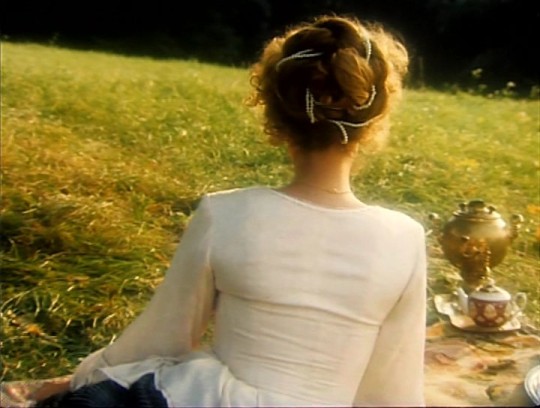
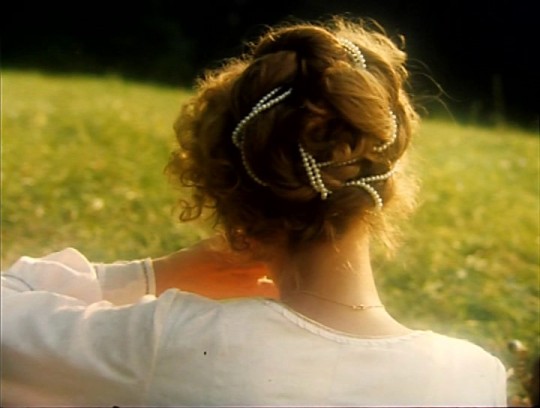
Lady Macbeth of the Mtsensk District, 1989
196 notes
·
View notes
Text
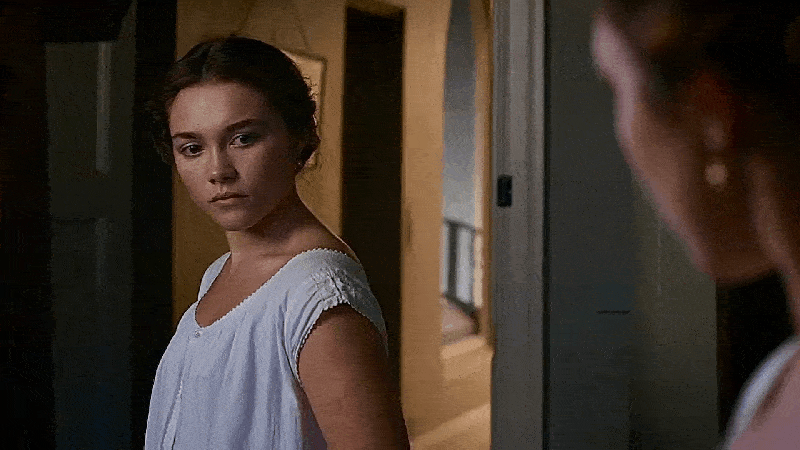
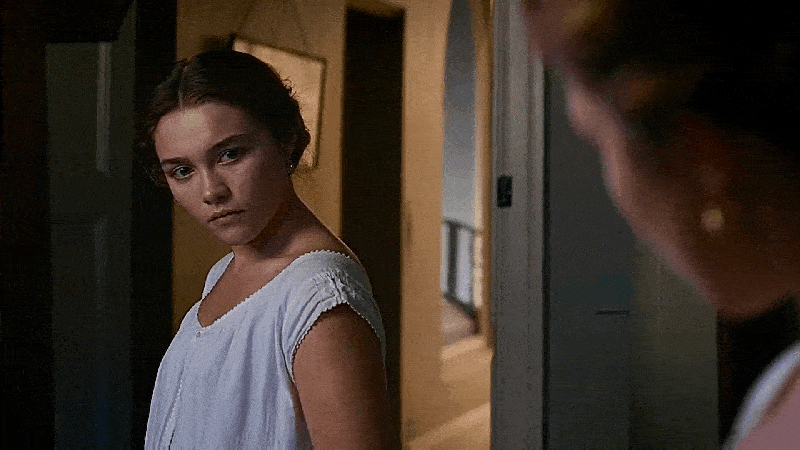
FLORENCE PUGH as KATHERINE LESTER
Lady Macbeth (2016), Dir. William Oldroyd
#lady macbeth#lady macbeth 2016#lady macbeth of the mtsensk district#katherine lester#florence pugh#florence pugh edit#fpughedit#lady macbeth edit#william oldroyd#cosmo jarvis#period drama#perioddrama#perioddramaedit#period drama edit#period drama costumes#period costume#period piece#periodgif#weloveperioddrama#perioddramasource#perioddramagif#film edit#filmedit
116 notes
·
View notes
Text

Just saw Lady Macbeth of Mtsensk district. Production was meh but the orchestra!!! Excellent!!
10 notes
·
View notes
Text
*tips fedora* m’lady m’cbeth of the m’tsensk district
(I am immediately fed poisoned mushroom soup)
#lady macbeth of the mtsensk district#opera#shostakovich#classical music#леди макбет мценского уезда#music history#composer
45 notes
·
View notes
Text
katerina kabanova (affectionately)
katerina izmailova (derogatory)
#okay i dont really hate katerina izmailova that much#but daaaaamn shes terrifying#ofc ruthlessly murdering your husband is a very girlboss move but idk if shes the case#also she doesnt give enough lady m vibes as the author tries to present it#nikolai leskov#lady macbeth of the mtsensk district#ostrovsky#the storm#katerina kabanova#katerina lvovna izmailova#russian literature#ruslit
4 notes
·
View notes